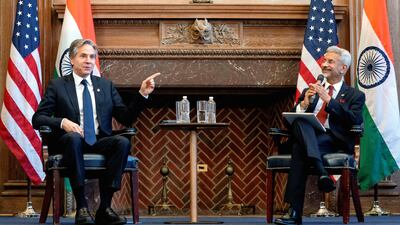US Secretary of State Antony Blinken is scheduled to arrive in New Delhi on Thursday to discuss defence, security, the Israel-Gaza conflict and more in bilateral talks, India’s External Affairs Ministry said.
Mr Blinken will be joined by US Defence Secretary Lloyd Austin for the fifth 2+2 Ministerial Dialogue on Friday with Indian Foreign Minister Subrahmanyam Jaishankar and Defence Minister Rajnath Singh.
They will review the progress made in defence and security co-operation, technology value chain collaborations and people-to-people ties, India’s Ministry of External Affairs said.
“The ministers will take the opportunity to progress the futuristic road map for the India-US partnership as envisioned by Prime Minister Narendra Modi and President Joseph Biden, in their discussions in June and September this year,” the ministry said.
India and the US have held the dialogue annually since 2018. Mr Jaishankar and Mr Singh travelled to Washington for the talks in April last year.
Mr Blinken’s visit to the Indian capital comes at the end of a week-long tour that included stops in Israel, Jordan, Cyprus, Iraq, the occupied West Bank, Turkey, Japan and South Korea. It was his second visit to the Middle East amid the Israel-Gaza war.
Experts say Gaza, as well as the war in Ukraine, are certain to feature in Friday's talks but the focus will remain on strengthening ties.
“The main focus of this meeting, as with all 2+2s, is to take stock of the relationship and review progress on current initiatives. Given how robust and multifaceted the relationship is, there will be much to discuss,” Michael Kugelman, director of the South Asia Institute at the Wilson Centre in Washington, told The National.
“It’s an especially important visit because each country has elections in the coming months, and so it will be important to ensure momentum in the partnership as each government turns its attention to domestic politics.”
Mr Austin and Mr Singh are scheduled to discuss defence and technology issues.
Washington designated India a major defence partner in 2016, giving the South Asian nation access to advanced and sensitive US equipment on par with its closest allies.
India has purchased $20 billion worth of US defence equipment since 2008.

Ukraine, Gaza and tensions with Canada
India and the US share a strategic, diplomatic and defence partnership, but they have taken different stances on the war in Ukraine, with New Delhi remaining neutral despite pressure from the US and other western states to condemn Russia's offensive. However, both Mr Biden and Mr Modi have explicitly commented on Israel's attack on Gaza.
“Ukraine and Gaza will both feature in the conversations. Because the US and India are largely on the same page on the Gaza war, that discussion will be more comfortable than the one on Ukraine,” Mr Kugelman said.
“But even on that latter issue, the US and India have essentially come to an understanding: India opposes the war and calls on Russia to end it, but it won’t criticise [Russian President Vladimir] Putin or Russia for waging it,” he said.
Another issue that could feature during the meeting is the diplomatic tensions between India and Canada after Prime Minister Justin Trudeau alleged that New Delhi had a role in the killing of Sikh separatist leader Hardeep Singh Nijjar.
India has rejected the allegations as “absurd” while the US has expressed “deep concerns” and supported Ottawa’s investigation into the matter.
Mr Biden reportedly raised the issue with Mr Modi when they met during the G20 Summit in New Delhi.
Mr Kugelman said the US was “troubled” by the crisis and would repeat its position that India should co-operate in Canada’s investigation, although this would not affect the relationship.
Focus on Asia-Pacific and China
India’s External Affairs Ministry said that the talks will address regional issues and their priorities for co-operation in multilateral platforms and frameworks such as the Quadrilateral Security Dialogue.
The latter, known as the Quad, is an informal strategic alliance between India, Australia, the US and Japan to ensure “free and open maritime navigation” in the Asia-Pacific, where Beijing is developing military and civilian infrastructure.
The US and its allies are competing against China’s growing influence in the region, which includes the Indian Ocean and the western and central Pacific Ocean, including the South China Sea.
Beijing has expressed reservations over the alliance and has called it an Asian version of Nato.
China’s growing influence in the region has been a concern for India, which is embroiled in a border dispute with its neighbour.
Diplomatic relations between the countries have remained frosty since 2020 when about 20 Indian soldiers were killed in a brawl with Chinese troops in the Ladakh region along the undemarcated border, known as the Line of Actual Control.
Mr Blinken’s visit comes days before Mr Biden is likely to meet Chinese President Xi Jinping on the sidelines of the Asia-Pacific Economic Co-operation Summit in San Francisco, in a move seen as a major shift in their relationship.
“New Delhi shouldn’t place too much stock in the potential Biden-Xi meeting, just as Washington shouldn’t overplay the periodic conciliatory signs in India-China relations,” Mr Kugelman said.
“There are enough conciliatory gestures in both relationships to keep them from collapsing, but at the end of the day they’re competitive and sometimes confrontational relationships – and they drive US-India partnership.”


